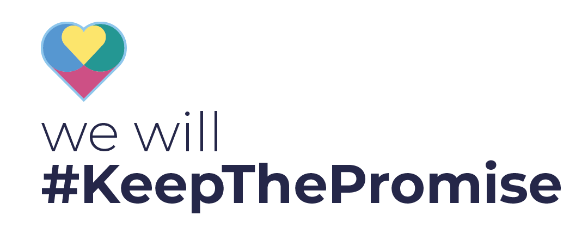
The Promise
What is the Promise?
Scotland's promise to care experienced children and young people is that they will grow up loved, safe, and respected.
To keep it, Scotland must bring about the change demanded by the Independent Care Review. The Independent Care Review was built on what children and young people had to say. They called for it and took part in it at huge levels.
When its findings were published in 2020, Scotland's First Minister pledged that the country would #KeepThePromise. And that commitment got the support of all the Scottish Parliament's political parties.
Scotland’s duties to care experienced children and young people:
All children should be able to grow up in a loving family environment.
It's fundamental to the human rights of all Scotland's children and young people. That's something made clear in the UN Convention on the Rights of the Child. To help make sure this happens for care experienced children, the Convention says there should be extra protections for them. But Scotland should take steps to make sure all children can grow up in this way.
Every child deserves to grow up safe, loved, and respected — and children should be able to stay with their families when they can. But sometimes, families need support to make sure this can happen. And when a child can’t stay with their family, they should still get the care that they need.
How does the Miracle Foundation work with and contribute to the Promise?
Out of the 5 priority areas – A good childhood, whole family support, planning, supporting the workforce, building capacity TMF primarily contribute to whole family support/therapies, peer, and community support.
Our counselling and art therapy teamwork with children and young people who have experienced significant bereavement and /or trauma. Many of the children and young people we work with have experienced significant loss/change and trauma within their families.
This can include sometimes multiple changes/loss of main carer/s, e.g., through parental drug/alcohol misuse, death of main carer e.g., by suicide, other ACES including physical/ emotional and sexual abuse.
Sometimes the Child or Young Person’s early experiences of unstable relationships can make it difficult to cope even when they are then placed within a more stable home environment. Individual art therapy and counselling can offer Children and Young People a safe space where they can express their thoughts and feelings. This therapeutic process can contribute to the Child or Young Person feeling validated, more emotional contained and secure within their home environment.
Counsellors and art therapists often offer some level of support to caregiver/s to help them understand young person better e.g., how their early experiences are affecting them currently. This process can contribute to development the attachment security within home environment. In addition, when needed parent/carer and child dyadic work can be offered, particularly when
children are still young. This kind of work usually consists of parent/carer only sessions to help them gain understanding of Child or Young Person’s needs and how they can support them. In addition, therapist/counsellor will offer parent/child joint sessions which aim to develop security of attachment.
In summary we provide:
- Family support / Therapies
Individual counselling /art therapy for Children and Young People, parent and child dyadic
art therapy and counselling, Art therapy groups.
- Peer support
Through Mental Health Workshop Programmes such as ‘Encouraging Growth & Resilience’,
‘Supporting Transitions’ and ‘Building Confidence & Self-Esteem’.

The Miracle Foundation Scio
The Miracle Foundation Scio
28 Muir Street
Motherwell, ML1 1BN


